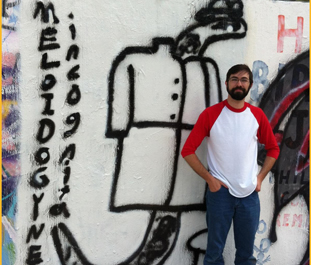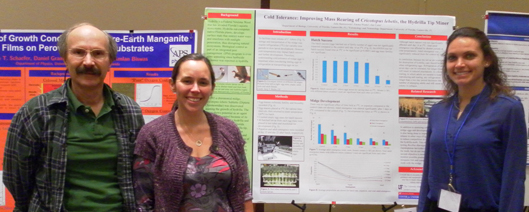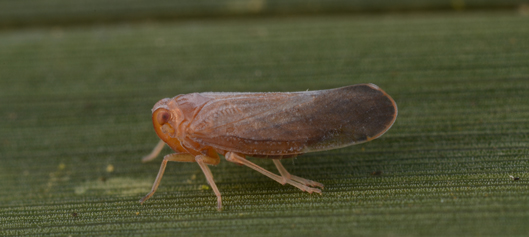- Faculty News
- Student News
- Lab News
- Publications
- Meetings and Presentations
- Outreach
- Grants
- Announcements
- About This Newsletter

ABOVE: David Sekora defended his M.Sc. last month. Part of his exam was to draw a root-knot nematode on the graffiti wall on 34th street. He got an A++ for this drawing.
Want to read your name in the newsletter?
Come join us, we have several exciting jobs open now. Please share these announcements with colleagues you think would be good additions to our team.
Position Title: Chair and Professor - Entomology and Nematology Department
Location: Entomology & Nematology Department
Gainesville, Florida
Position Title: Assistant Professor of Subtropical/Tropical Fruit Crop Entomology
Location: Tropical Research and Education Center
Homestead, Florida
Position Title: Assistant Professor of Strawberry and Small Fruit Entomology
Location: Gulf Coast Research and Education Center
Wimauma, Florida
 Wood-boring beetles and fungi
Wood-boring beetles and fungi
As wood-boring beetles and fungi are increasingly impacting forest and industries in the U.S., the demand for research on these organisms is also increasing. Dr. Jiri Hulcr, the UF/IFAS Forest Entomologist, was invited on to present his lab’s research on ambrosia beetles and fungi at four Universities across the eastern U.S. On this three-week “tour,” he was hosted by entomology departments at Auburn University, University of Kentucky, University of Tennessee, and Virginia Tech. A snapshot from one stop at this can be seen on YouTube: a recorded presentation and questions session at the University of Tennessee Department of Entomology and Plant Pathology.
 A successful Cornell and UF partnership
A successful Cornell and UF partnership
A team of researchers (Ms. Lucy Kavi, Dr. Phillip Kaufman and Dr. Jeff Scott) has recently selected a strain of house fly having some of the highest levels of resistance to the neonicotinoid insecticide imidacloprid that have ever been reported in any insect. The team's recently published study (Pestic. Biochem. Physiol. 109: 64-69) found that the 2,300-fold resistance was linked to chromosomes 3 and 4, had a significant fitness cost in the absence of resistance and was at least partly due to a change in the insecticide’s target site. There was limited cross-resistance to other insecticides, suggesting that imidacloprid might be sustainably used for house fly control if it was used in rotation with other insecticides.
 Several of our faculty have recently published a book called "Pests in and around the southern home." It can be a useful reference for Master Gardeners, county extension faculty, and pest management professionals (urban and landscape), and it will be used as a textbook for an undergraduate Turf and Ornamentals Entomology course. It is a nice resource with great pictures for people in the southeastern U.S., Gulf Coast states, and the Caribbean.
Several of our faculty have recently published a book called "Pests in and around the southern home." It can be a useful reference for Master Gardeners, county extension faculty, and pest management professionals (urban and landscape), and it will be used as a textbook for an undergraduate Turf and Ornamentals Entomology course. It is a nice resource with great pictures for people in the southeastern U.S., Gulf Coast states, and the Caribbean.
 Dr. Marjorie Hoy has agreed to serve on the Advisory Board of the BINGO project: Breeding Invertebrates for Next Generation BioControl, a research consortium of seven EU countries, including universities and commercial organizations involved in biological control.
Dr. Marjorie Hoy has agreed to serve on the Advisory Board of the BINGO project: Breeding Invertebrates for Next Generation BioControl, a research consortium of seven EU countries, including universities and commercial organizations involved in biological control.
 A unique experience for the mosquito enthusiast – FMEL’s mosquito identification course 2014. Posted by Sean McCann on March 28, 2014, on the ESC Blog, the official blog of the Entomological Society of Canada.
A unique experience for the mosquito enthusiast – FMEL’s mosquito identification course 2014. Posted by Sean McCann on March 28, 2014, on the ESC Blog, the official blog of the Entomological Society of Canada.
 Dr. James P. Cuda was featured in a newspaper article about his team's USDA-funded hydrilla IPM research and extension project. The article by staff writer Steve Reilly was titled Flies in the Florida Fight against Hydrilla.
Dr. James P. Cuda was featured in a newspaper article about his team's USDA-funded hydrilla IPM research and extension project. The article by staff writer Steve Reilly was titled Flies in the Florida Fight against Hydrilla.
Dr. James P. Cuda participated in the 2014 CALS Teaching Retreat held at the Emerson Alumni Hall, 18 March.
Dr. Shweta Sharma joined the laboratory of Dr. James P. Cuda. Dr. Sharma will be conducting biological and host-range studies on the Brazilian peppertree weevil Apocnemidophorus pipitzi.
Ms. Casey Parker, a graduating senior from the department, will be giving the CALS commencement speech on May 4th at 7:00 pm!
 Ms. Erika Machtinger was chosen to receive one of the 2013-2014 UF Graduate Student Teaching Awards! This semester, TA award winners will be recognized in the commencement program.
Ms. Erika Machtinger was chosen to receive one of the 2013-2014 UF Graduate Student Teaching Awards! This semester, TA award winners will be recognized in the commencement program.
 We are very pleased to announce that, for the first time, UF will be part of the Annual Council on Undergraduate Research (CUR) poster session on Capitol Hill, April 28-29. Our student Sabrina Leisinger was selected to present her work with Dr. Daniel Hahn, "Do modified atmospheres used in produce transportation make insect pests more resistant to irradiation as a phytosanitary treatment?"
We are very pleased to announce that, for the first time, UF will be part of the Annual Council on Undergraduate Research (CUR) poster session on Capitol Hill, April 28-29. Our student Sabrina Leisinger was selected to present her work with Dr. Daniel Hahn, "Do modified atmospheres used in produce transportation make insect pests more resistant to irradiation as a phytosanitary treatment?"
Sabrina will participate in an evening poster session and reception where students will have the opportunity to speak directly to members of Congress and demonstrate how they have been impacted by these programs. This event is designed to help Congress learn about the importance and impact of undergraduate research programs.
Congratulations to Sabrina and Dr. Hahn for becoming part of this event!

Ms. Julie Baniszewski prepared and submitted her honor’s thesis to the CALS Honors Program. The thesis was titled "Improvements for mass rearing Cricotopus lebetis (Diptera: Chironomidae) for biocontrol of Hydrilla verticillata (Hydrocharitaceae)."

ABOVE: Dr. James P. Cuda and Dr. Emma Weeks were co-authors on a poster presentation presented by Ms. Julie Baniszewski titled "Cold tolerance: improving mass rearing of Cricotopus lebetis, the hydrilla tip miner." The poster was at the Annual UF Undergraduate Research Symposium held at the Reitz Union, 27 March.
 Thank you from Cornell's Undergraduate Entomology Club
Thank you from Cornell's Undergraduate Entomology Club

ABOVE: Kyle DeMarr, Brett Morgan, Hunter Reid, Marina Mann, and Marvelyn Barboza, members of Snodgrass and Wigglesworth: Cornell's Undergraduate Entomology Club.
The visiting Cornell undergraduates would like to thank you all for opening up the department and your labs to them. Engaging with our graduate students and faculty was extremely interesting and engaging, and it gave them a very positive first impression of the University of Florida in Gainesville. The students promise to return to Ithaca to inform other undergraduate majors of the abundance of resources offered at UF and the hospitality they received. It was a great experience for them to see the wide array of disciplines the department spans while still focusing on the central theme of innovation.
 Aaron Pomerantz successfully submitted his M.S. thesis to the Graduate School March 27, 2014: Identification and Analysis of Potential Sex-determination Genes in Metaseiulus occidentalis (Acari: Phytoseiidae).
Aaron Pomerantz successfully submitted his M.S. thesis to the Graduate School March 27, 2014: Identification and Analysis of Potential Sex-determination Genes in Metaseiulus occidentalis (Acari: Phytoseiidae).
Haleigh Ray successfully submitted her M.S. thesis to the Graduate School March 26, 2014: Evaluation of the Predacious Mite Hemicheyletia wellsina (Acari: Cheyletidae) as a Predator of Arthropod Pests of Orchids.
Need to name that bug? A host of experts are available to help Floridians identify any insect or related arthropod. If a mystery creature has six or more legs, the UF Insect ID Lab is the place to call.

ABOVE: A new planthopper was recently described from cabbage palms in Florida (Halbert et al. 2014). It is Omolicna joi in the family Derbidae. Adults are found mainly in the fall (August to October) on Sabal palmetto leaves. It is widely distributed in the state from the far western Panhandle counties to as far south as Lee and Palm Beach counties.
Lyle Buss is the Insect ID Lab manager.
 Think it might be a nematode problem? The Nematode Assay Laboratory serves Florida and other states by providing nematode assays and expert advice regarding nematode management.
Think it might be a nematode problem? The Nematode Assay Laboratory serves Florida and other states by providing nematode assays and expert advice regarding nematode management.
For more information on the Nematode Assay Laboratory please contact the lab manager Dr. Tesfa Mengistu.
Carrillo D, Hoy MA, Pena JA. 2014. Effect of Amblyseius largoensis (Acari: Phytoseiidae) on Raoiella indica (Acari: Tenuipalpidae) by predator exclusion and predator release techniques. Florida Entomologist 97: 256-261.
Crow WT, Luc JE. 2014. Field efficacy of furfural as a nematicide on turf. Journal of Nematology 46: 8-11.
Halbert SE, Wilson SW, Bextine B, Youngblood SB. 2014. Potential planthopper vectors of palm phytoplasmas in Florida with a description of a new species of the genus Omolicna (Hemiptera: Fulgoroidea). Florida Entomologist 97: 90-97.
Lapointe SL, Stelinski LL, Keathley CP, Mafra-Neto A. 2014. Intentional coverage gaps reduce cost of mating disruption for the leafminer Phyllocnistis citrella in citrus. Journal of Economic Entomology 107: 718-726.
Scheffrahn RH, Hochmair HH, Kern Jr WH, Warner J, Krecek J, Maharajh B Cabrera BJ, Hickman RB. 2014. Targeted elimination of the exotic termite, Nasutitermes corniger (Isoptera: Termitidae: Nasutitermitinae), from infested tracts in southeastern Florida. International Journal of Pest Management (ahead-of-print) 1-13. View full text DOI: 10.1080/09670874.2014.882528
Quesenberry K, Munoz P, Blount A, Kenworthy K, Crow W. 2014. Breeding forages in Florida for resistance to nematodes. Crop and Pasture Science.
 New on Featured Creatures:
New on Featured Creatures:
aster leafminer moth, Leucospilapteryx venustella (Clemens)Authors: Rodrigo Diaz, Esteban Tapia, Veronica Manrique, William A. Overholt, Biological Control Research and Containment Laboratory, University of Florida; Donald R. Davis, Department of Entomology, National Museum of Natural History, Smithsonian Institution
Do you have a favorite creature? Learn how to make it into a Featured Creature!
Dr. Marjorie Hoy and Dr. Jennifer Gillett-Kaufman contributed a presentation on the eriophyid mite involved in Rose Rosette Disease, including its biology, behavior, and potential control tactics. The workshop and in-service training was organized by Dr. Mathews Paret and took place on March 19, 2014, at NFREC-Quincy. This rose disease was recently discovered in Florida.

Dr. Billy Crow spoke at the Florida Turfgrass Association regional seminar in Ft. Myers on "Nematode Management in Florida Landscapes."

Dr. James P. Cuda attended the XIV International Symposium on the Biological Control of Weeds in Skukuza, Kruger National Park, South Africa, 2-7 March. Cuda was a co-author on two poster presentations titled “Biological Control of Solanum viarum in Florida, USA: a Successful Project,” and “Evaluation of a Gall-forming Psyllid (Calophya latiforceps) as a Biological Control Agent of Brazilian Peppertree”.
Dr. James P. Cuda was an invited speaker for one of the 2014 LAKEWATCH training sessions held in Rotunda, FL, 13 March. Cuda gave a presentation titled “Integrated Management of Hydrilla in Florida.” The presentation was co-authored by Dr. Jennifer Gillett-Kaufman, Dr. Raymond Hix, Dr. Verena Ulrike-Lietze, and Dr. Emma Weeks.
 The images from Bee College 2014 are available for viewing and/or download. The links below lead to where the high resolution files are being posted temporarily so that they may be downloaded, and the web gallery. From the download page you can choose to download and save individual images or they can all be downloaded at once by saving the "archive.zip" file from atop the file list to your computer. While the gallery will likely remain posted for an indefinite amount of time, the high resolution download page and link will be removed within a matter of weeks.
The images from Bee College 2014 are available for viewing and/or download. The links below lead to where the high resolution files are being posted temporarily so that they may be downloaded, and the web gallery. From the download page you can choose to download and save individual images or they can all be downloaded at once by saving the "archive.zip" file from atop the file list to your computer. While the gallery will likely remain posted for an indefinite amount of time, the high resolution download page and link will be removed within a matter of weeks.
From the Outreach Coordinator
The live critters are always a hit with children and adults alike. The critters are available for you to check out should you be leading an outreach event. We have doubles of our most popular critters, as well as various native insect species depending on the time of year. We have large wood and Plexiglas cages for viewing our native orb weaving spiders. There is one travel cage and one larger static cage. Please be sure to contact us and review the protocol on transporting and handling the critters if you are not already familiar with it. If you lead an outreach, be sure to fill out a documentation form so your event can be included in the newsletter and we can log all outreach events.
If you would like to schedule an event or have any outreach questions, go to the Outreach pages on our Bug Club Website and contact us.
- Stephanie Stocks, Outreach Coordinator
- Office number 352-273-3958
 Getting social!
Getting social!
We have several social media sites for the Entomology & Nematology Department. To make them easily searchable, all three (YouTube, Facebook and Twitter) have the same page name: UFEntomology. Please share these links with past students or colleagues who may have an interest in departmental activities.
Virni Mattson, our grants specialist, reports that we have so many grants to process in April that we will report our March external funding for all Entomology & Nematology faculty (in Gainesville and at RECs) next month!
August 3rd to the 6th, 2014, at the Jupiter Beach Resort and Spa in Jupiter, Florida.
Exhibitors/Vendors are welcome and for a fee can set up a booth for all three days of the meeting. Two lunch tickets are included.
Call for Paper/Poster Submissions is open the deadline is May 31 - see our website for the Abstract Submission Form.
Please send all submissions to:
Cindy McKenzie, Ph.D.
Research Entomologist
US Horticultural Research Laboratory / ARS-USDA
2001 South Rock Road
Fort Pierce, FL 34945
772.462.5917 office
772.462.5911 lab
772.462.5986 fax
Cindy.mckenzie@ars.usda.gov
Please forward your nominations to Clark Lovelady, Past President, clark.lovelady@syngenta.com. Self nominations are also accepted. The responsibilities of the two offices can be found in the Operating Guidelines in the 2010 Revisions to Guidelines/Awards Lists.
FES Honors and Awards 2014
The FES Honors and Awards Committee are requesting nominations for 2014 in the following categories:
Entomologist of the year.
Annual Achievement Award for Research
Annual Achievement Award for Extension
Annual Achievement Award for Industry
Annual Achievement Award for Teaching
Annual Achievement Award for Regulatory Entomology
Achievement Award for a Collaborative Research Team
Any other special awards
Winners will be announced at the 2014 Annual Meeting. Each nomination should be accompanied with a justification narrative that will be read at the awards luncheon.
Nomination deadline is July 1, 2014. Look at some of our previous winners.
Nominations should be sent to:
Jawwad Qureshi, Ph.D.
University of Florida, IFAS
Southwest Florida Research and Education Center
2685 SR 29 N
Immokalee, FL 34142-9515 USA
Ph: 239-658-3451
Fax: 239-658-3469
jawwadq@ufl.edu
 2014 Southeast Pest Management Conference
2014 Southeast Pest Management Conference
We will have:
- a full day (5 CEUs) of GHP on Monday, plus 2 CORE CEUs
- a full day (5 CEUs) of WDO on Tuesday, plus 2 CORE CEUs
- a full day (5 CEUs) of L&O on Wednesday, plus 2 CORE CEUs
- a separate 2-CEUs track on Fumigation on Tuesday
- the Canine Pest Detection Certification trials on Wednesday
Again this year, Dr. Rebecca Baldwin and her team will be providing ACE Training on Wednesday for those wishing to become an Associate Certified Entomologist.
All you need to do now is go to the SEPMC website and register.
We hope to see you here in Gainesville (May 4th to 7th), for the 2014 Southeast Pest Management Conference.
We like to share news when it happens using our social media outlets: Twitter, Facebook and YouTube. Follow us on these sites for daily updates! When you send news, we will post it on one or more of these sites and again in the monthly newsletter. Please be sure you have permission from people in photographs you submit for publication.
UF-Bugnews-L listserv subscribers receive notices when issues are posted. Our home page has instructions for subscribing and unsubscribing.
Special thanks to Dr. Verena Lietze and Nancy Sanders, who reviewed the newsletter for errors, and to Jane Medley and Don Wasik, who built the web page design.